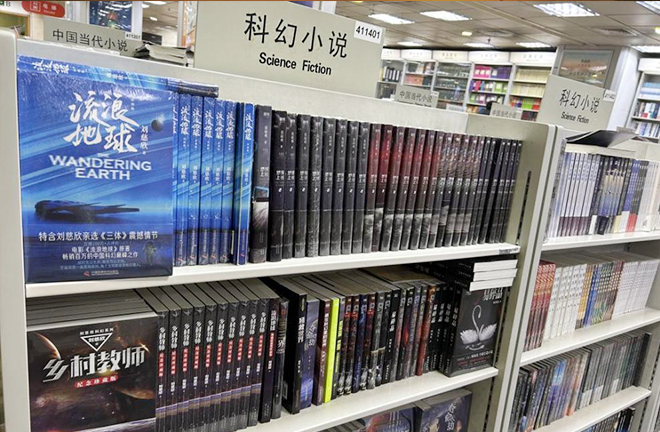Scholars reflect on fiction composition and theory

A display of science fiction at Wangfujing Bookstore in Beijing Photo: Yang Lanlan/CSST
More than 130 renowned writers, scholars, translators, and theorists from over 60 universities, research institutions, and literary organizations from China and abroad convened for a symposium on “theoretical reflection and value reconstruction in fictional studies” in Suzhou, Jiangsu Province, in late October.
Ontology of literature
The 20th century is often called the “century of theory,” with various schools of thought creating a cacophony of voices. Entering the 21st century, debates surrounding “theory” have emerged one after another. Terry Eagleton’s After Theory seems to signal an end to this theoretical age, while Vincent Leitch’s Literary Criticism in the 21st Century: Theory Renaissance argues that theory is far from obsolete and remains brimming with vitality and a noble mission. Fiction and theory share a close, natural connection; many theoretical schools are rooted in the practice of fiction writing, while fiction writing can, in turn, inspire and innovate theoretical reflection.
Today, various “isms” and ideas intertwine and clash with each other, with the boundaries and functions of novels continually evolving under the influences of technology, capital, and market forces. Novels engage with and, in some respects, guide shifts in values. Zhu Zhenwu, a professor from the School of Humanities at Shanghai Normal University, believes that reflection on fiction theory entails a critique and reconstruction of existing theories. As Eagleton suggests in After Theory, literary theory should return to the ontology of literature and engage in constructive reflection. Theory is not a relic of the past—it continuously synthesizes experience and remains generative.
Bi Feiyu, chair of the Writers Association of Jiangsu Province and a professor from the School of Liberal Arts at Nanjing University, draws on his own fiction writing to identify three key components of the writing process: perception of the world, aspiration, and emotion. A work’s credibility stems from its perception, while a writer’s aspirations shape its direction. A well-crafted piece of writing emerges from a systematic language built on experience, accumulated reading, moral depth, and aesthetic sensibilities. Bi emphasized aspiration as the most important element in a work. Using Lu Xun’s The True Story of Ah Q as an example, he examined the tension between individual desires and external expectations, noting how Lu Xun skillfully conveys sorrow through a “joyful” touch. Emotion, as another vital factor, infuses immense energy and remains ever-present in the depths of the human psyche.
Jiang Chengyong, a professor from the School of Humanities and Communication at Zhejiang Gongshang University, distinguished the unique phenomenon of “examining ugliness” in modern fiction from the traditional aesthetics mechanisms in Western fiction. He argued that modern experimental fiction no longer intends to “persuade,” “mobilize,” or “educate.” Instead, through a shocking portrayal of ugliness, they vividly disclose the realities of modern society. Such novels break from traditional narrative forms, using the “sensation of pain” to pierce through the superficial layers of material civilization and engage with the long-numbed human spirit with harsh realism. This distinct sense of reality extends to abnormal “ugliness,” and the resulting “shock” paves the way for new forms of artistic expression.
Literary research community
The true purpose of China’s cultural “going global” initiative is to achieve cross-regional, cross-national, cross-ethnic, and cross-cultural engagement, building a literary research community that fosters mutual understanding among civilizations. Zhu called on Chinese scholars to integrate, deconstruct, and absorb Western ideas in the exchange of Chinese and Western culture, philosophy, and literary theory, emphasizing the necessity of constructing an academic discourse based on Chinese literature and cultural perspectives.
“Details and scenes are indispensable in classic fiction, and a quality work should embody both historical and indigenous knowledge. Thus, literature serves as a way to understand society,” said Liu Jianjun, a professor from the School of Foreign Languages at Shanghai Jiao Tong University. Liu identified three core elements of classic foreign fiction: rich detail and scene setting, historical and indigenous knowledge, and universally relevant philosophy—elements that together convey the wisdom of life embedded within a work.
Yu Jianhua, a professor from the School of English Studies at Shanghai International Studies University, investigated the potential for intertextual interpretations between history and literature, noting that American historical fiction, in particular, offer a wealth of resources. Through their works, writers bear witness to and participate in the construction of history, offering supplementary and corrective historical contexts and insights that help readers gain new perspectives on American history, politics, and culture through a literary lens.
Guo Yingjian, a professor from the School of Foreign Languages at Renmin University of China, examined specific fictional cases to analyze the real impact that literature, particularly fiction, has on American politics. He argued that even in an era defined by information technology, commercialization, and artificial intelligence, fiction and literature continue to wield a profound influence on government decision-making, law-making, and public opinion.
Zhang Longhai, vice president of Minnan Normal University, highlighted the complementary relationship between literature and science, adding that science can enrich literary content, creative concepts, genres, and styles, while the humanistic thought and critical reflection inherent in literature facilitate the healthy and sustainable development of science.
Edited by YANG LANLAN
